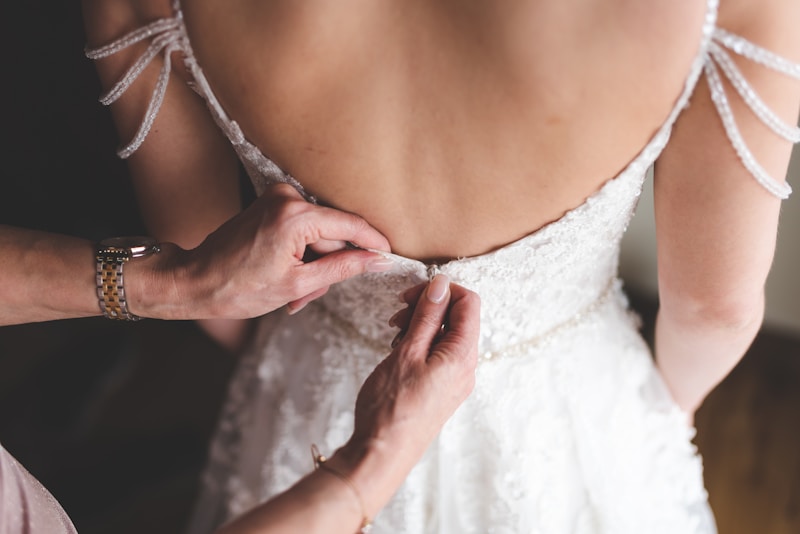Common Wedding Dress Alterations and Adjustments: A Comprehensive Guide
Common Wedding Dress Alterations and Adjustments: A Comprehensive Guide
Planning a wedding is an exciting yet challenging endeavor, with countless details demanding your attention. Among these, choosing the perfect wedding dress is one of the most significant aspects. However, it's essential to recognize that a wedding dress often requires alterations to ensure it fits perfectly. In this article, we will explore common wedding dress alterations and adjustments, providing insights into the processes and costs involved.
Understanding Wedding Dress Alterations
Wedding dress alterations are modifications made to a gown to achieve the ideal fit tailored to your body shape. While many dresses are designed to accommodate diverse sizes, they usually need adjustments to ensure you feel comfortable and confident on your special day. Here are some common reasons for alterations:
- Size adjustment: Dresses may be too large or too small.
- Length modification: Hemming is often necessary, especially for floor-length gowns.
- Style changes: Adding or removing sleeves, altering necklines, or changing the silhouette.
- Comfort and support: Adding underwire, bust cups, or other supportive modifications.
Common Alterations Explained
Below are detailed descriptions of the most common wedding dress alterations and adjustments:
| Alteration Type | Description | Average Cost (USD) |
|---|---|---|
| Hemming | Shortening or lengthening the dress. | $100 - $300 |
| Taking In | Adjusting the sides for a tighter fit. | $50 - $150 |
| Letting Out | Making the dress larger if needed. | $50 - $150 |
| Adding Sleeves | Incorporating straps or sleeves for added coverage. | $75 - $200 |
| Altering Necklines | Changing the dress neckline for style or comfort. | $100 - $200 |
| Adding Cups | Inserting bust cups for additional support. | $30 - $60 |
| Customized Bustle | Creating a bustle to lift the train for dancing. | $75 - $150 |
Hemming: A Vital Adjustment
The hemline of your dress is crucial for both style and comfort. A proper hem ensures that your dress is not too long or too short, allowing you to move freely without tripping over the fabric. Typically, the average cost for hemming ranges from $100 to $300, depending on the intricacy of the design and the amount of fabric that needs to be adjusted. Consider how shoes will affect the dress length; heels can add several inches, leading brides to choose a longer hem initially.
Taking In and Letting Out: The Fit Factor
Your wedding dress should fit like a glove. Taking in or letting out the sides of the dress is a common alteration. If the dress is too loose, adjustments can enhance your silhouette. Conversely, if it’s too tight, experienced tailors can gently let out seams. The average cost for taking in or letting out ranges from $50 to $150.
Adding Sleeves and Altering Necklines
Brides may wish to modify their gowns by adding sleeves for a more modest look or altering necklines to match their preferred aesthetics. This type of alteration can enhance the dress's overall design and potentially change its silhouette. Expect costs from $75 to $200 for adding sleeves or $100 to $200 for neckline alterations.

Preparing for Your Alteration Appointment
When preparing for your wedding dress fitting, it's essential to consider the following:
- Time Frame: Schedule your alterations at least two to three months before the wedding date, allowing enough time for multiple fittings.
- Bring Your Accessories: Always wear the shoes and undergarments you plan on wearing on your wedding day. This ensures accurate measurements for height and fit.
- Communicate Clearly: Be honest about how you want your dress to look. Show inspiration photos to give the tailor a clear idea of your vision.
The Cost of Alterations: What to Expect
Overall, the cost for alterations varies significantly based on several factors, including the complexity of the design, the amount of fabric involved, and the tailor’s expertise. On average, most brides can expect to spend between $300 and $800 on alterations. Setting a budget for alterations is advisable, so you don't experience financial stress leading up to your wedding day.
Finding the Right Tailor
Choosing a skilled and reputable tailor is essential. Look for recommendations from friends or read online reviews. It’s essential to find someone who specializes in Wedding dresses. Visit potential tailors for a consultation, ensuring they understand your vision and can provide the alterations you need. Don't hesitate to ask about their experience and previous work!
Common Questions Brides Ask
How many fitting sessions will I need?
Most brides typically attend two to three fittings, depending on the depth of alterations required. You'll often return for minor adjustments after a fitting.
What should I do if my dress arrives late?
If you encounter delays, contact the bridal shop immediately. Communicate with your tailor to see if adjustments can still be completed in time.
Can I make alterations on a rental dress?
It's advisable to ask the rental company that provided the dress, as some policies may allow minor alterations. However, it's essential to maintain the integrity of the rental agreement.
Final Thoughts
Ensuring your wedding dress fits perfectly is crucial for your big day. Understanding common wedding dress alterations and adjustments will allow you to make informed decisions and avoid last-minute surprises. By investing time and resources into tailoring your dress, you’re guaranteed to achieve that stunning look you’ve always dreamed of. Remember to plan ahead and communicate your needs clearly to your tailor, which will help make the alteration process smooth and enjoyable!
